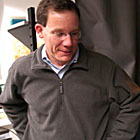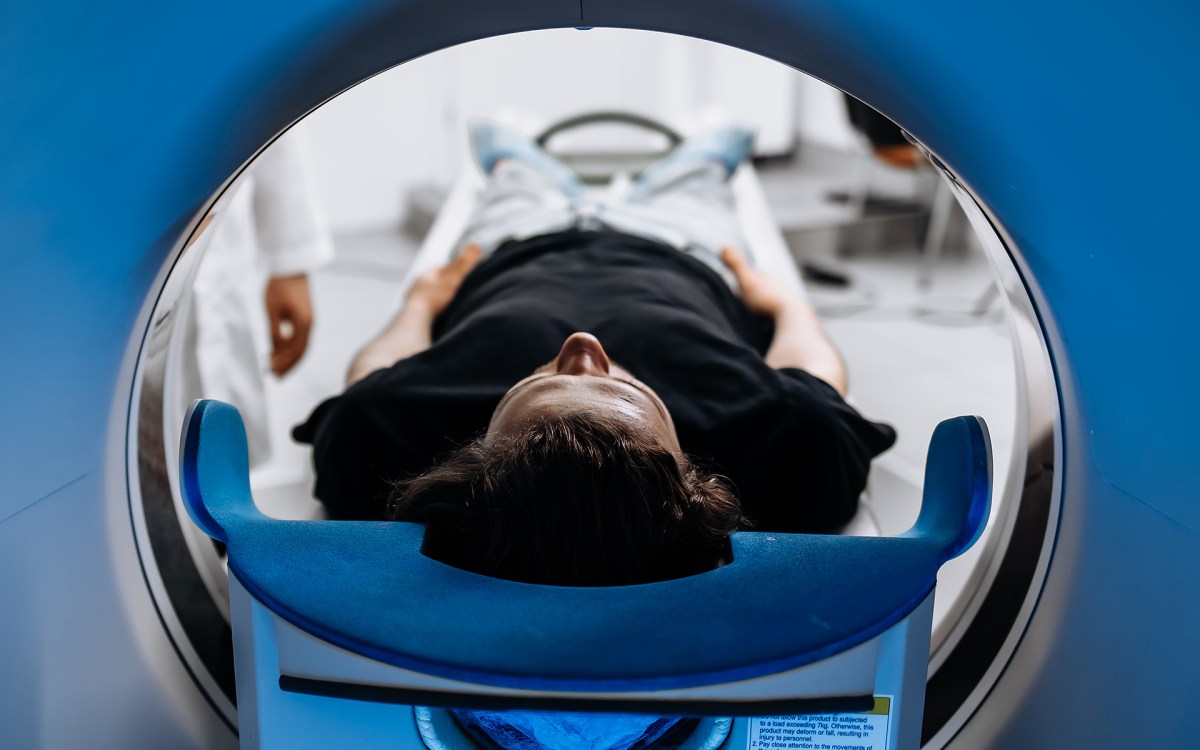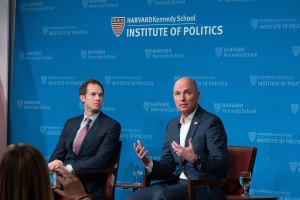Tag: Research
-
Health
Field school brings students to Borneo
Morning came in the middle of the night in the hikers’ hut partway up the side of Borneo’s towering Mount Kinabalu.
-
Campus & Community
Newsmakers
Visiting scientist Frederick “Skip” Burkle, a senior fellow at the Harvard Humanitarian Initiative (HHI), was recently elected to the Institute of Medicine (IOM). New York Times columnist Maureen Dowd will deliver the Theodore H. White Lecture on Press and Politics Thursday (Oct. 25) at 6 p.m. in the John F. Kennedy Jr. Forum at the…
-
Campus & Community
Newsmakers
Katherine Swartz, professor of health policy and economics at the Harvard School of Public Health (HSPH), has been elected to the Institute of Medicine (IOM). Swanee Hunt, founding director of the Women and Public Policy Program at the Kennedy School of Government (KSG) and an adjunct lecturer in public policy at the School, was inducted…
-
Health
Nanowire makes own electricity
Harvard chemists have built a new wire out of photosensitive materials that is hundreds of times smaller than a human hair. The wire not only carries electricity to be used in vanishingly small circuits, but generates power as well.

-
Health
Study probes academic, industry relationships
A study led by members of the Massachusetts General Hospital Institute for Health Policy (MGH-IHP) has found that institutional academic-industry relationships — financial relationships companies have with medical schools or teaching hospitals rather than with individual physicians or scientists — are as common and pervasive as individual relationships. The report, the first nationwide look at…
-
Campus & Community
Shore Fellows awarded valuable time
N. Stuart Harris, an emergency physician at Massachusetts General Hospital, is also an active researcher doing groundbreaking research on hypoxia — a shortage of oxygen in the body.
-
Campus & Community
Center for European Studies names fall fellows
The Minda de Gunzburg Center for European Studies (CES) has recently announced the arrival of its 2007 fall fellows. The center is dedicated to fostering the study of European history, politics, and society at Harvard. Its visiting scholars play an active role in the intellectual life of the center and the University. While at Harvard,…
-
Campus & Community
Program on U.S.-Japan Relations announces 16 program associates, fellows
The Program on U.S.-Japan Relations has announced this year’s class of program associates, which includes scholars, professors, government officials, businesspeople, and journalists from Japan, the United States, and elsewhere.
-
Health
Hormone therapy for prostate cancer puts heart at risk
Administering androgen deprivation therapy (ADT) prior to surgery and combining ADT with radiation therapy are popular approaches to treating men diagnosed with advanced or high-risk localized prostate cancer. However, the potentially negative side effects of ADT are just now being explored. Researchers at Brigham and Women’s Hospital (BWH) have found that ADT may increase the…
-
Health
Researchers better understand biological clock
Researchers at Harvard University and the Howard Hughes Medical Institute (HHMI) have discovered that a simple circadian clock found in some bacteria operates by the rhythmic addition and subtraction of phosphate groups at two key locations on a single protein. This phosphate pattern is influenced by two other proteins, driving phosphorylation to oscillate according to…
-
Health
Mahzarin Banaji looks at biology of bias
Mahzarin R. Banaji, a Harvard social psychologist, studies how people think, and how they think they relate to one another. She’s an expert in the little secrets we all have: those implicit attitudes — sometimes prejudicial — regarding race, age, gender, and similar territories of otherness.
-
Health
Biologists remember landmark theory
Forty years ago, Edward O. Wilson and Robert H. MacArthur described how size and isolation determine how many species an island can support. Last week, biologists gathered to mark the theory’s anniversary, calling it a “pivotal point” in ecology’s relatively short history.
-
Health
At HMOs, Medicaid patients fare worse than others
Once viewed as a panacea to the nation’s health care problems, HMOs have fallen out of favor. Commercially insured patients who flooded into HMOs, or managed care, in the early 1990s left in droves by the end of the decade. Medicaid patients, however, don’t always have the luxury of choosing their health plans, and the…
-
Campus & Community
Newsmakers
It was announced Wednesday (Oct. 10) that the prestigious 2007 IZA Prize in Labor Economics goes to Harvard’s Richard B. Freeman. He was praised by the Institute for the Study of Labor (IZA) in Germany for “fundamental contributions that have monumentally shaped modern labor economics.”
-
Campus & Community
Harvard-Yenching Institute names visiting scholars, fellows
The Harvard-Yenching Institute recently welcomed 33 visiting scholars and fellows to the institute for the 2007-08 academic year.
-
Campus & Community
Harvard Forest announces Bullard Fellows
Harvard Forest recently announced the 2007-08 Charles Bullard Fellows in Forest Research. The purpose of this fellowship program, established in 1962, is to support advanced research and study by persons who show promise of making important contributions, either as scholars or administrators, to forestry defined in its broadest sense as the human use and study…
-
Science & Tech
Harvard brings the Earth to high school
Steam vents in Yellowstone National Park are part of the area’s unique environment, seen in a case study exploring Yellowstone and the reintroduction of wolves into the park. This case study is part of a new environmental science course for high school science teachers.
-
Science & Tech
Ancient practice sans theory
Move over, Archimedes. A researcher at Harvard University is finding that ancient Greek craftsmen were able to engineer sophisticated machines without necessarily understanding the mathematical theory behind their construction.
-
Health
Stem cells may enhance capability of heart cells to regenerate
During a fatal heart attack, at least 1 billion heart cells are killed in the left ventricle, one of the heart’s two big lower pumping chambers that move blood into the body.
-
Health
Stem Cell Summit draws 500 participants
Massachusetts Gov. Deval Patrick Wed-nesday (Oct. 3) called on those attending the second day of a Harvard Stem Cell Institute (HSCI)-sponsored Stem Cell Summit to support his proposed $1 billion life sciences initiative “so we can get partnering with you.”
-
Campus & Community
Chili pepper cocktail points to wide-awake surgery
Imagine an epidural or a shot of Novocain that doesn’t paralyze your legs or make you numb yet totally blocks your pain. This type of pain management is now within reach. As a result, childbirth, surgery, and trips to the dentist might be less traumatic in the future, thanks to researchers at Massachusetts General Hospital…
-
Health
Research links panic and heart attack in older women
New research has linked panic attacks in older women with an increased risk of heart attack, stroke, and death from all causes, adding panic attacks to the growing list of mental and emotional conditions with potentially deadly physical effects.
-
Campus & Community
American Indians bless search for Harvard roots
With a ceremonial blessing and a cautionary reminder of native peoples’ historic oppression, a group of American Indian leaders joined an assemblage of experienced and budding archaeologists Wednesday (Sept. 26) to begin the search for Harvard’s Indian College roots.
-
Campus & Community
Weatherhead Center names 2007-08 associates
The Weatherhead Center for International Affairs is supporting 24 doctoral candidates as Graduate Student Associates for 2007-08. The associates represent a multidisciplinary group of advanced-degree candidates from Harvard’s departments of Anthropology, Government, History, Religion, and Sociology; the Kennedy School’s Public Policy Program; and the Law School’s S.J.D. program. All of the students are working on…
-
Campus & Community
Weatherhead Center selects a dozen new international fellows
The Weatherhead Center for International Affairs (WCFIA) recently announced its 2007-08 class of fellows.
-
Health
Children forgotten part of AIDS picture
The forgotten faces of the AIDS epidemic belong to children: infected, neglected, and orphaned by a disease that ravages not only their bodies, but also their families and communities, according to a gathering of international AIDS experts Monday (Sept. 24).
-
Health
Harvard researchers find longevity, restricted diet link
Researchers believe they’ve found the cellular link between extremely restricted diets and dramatically lengthened lifespan and hope to use the knowledge to develop new treatments for age-related diseases.
-
Campus & Community
Harvard christens School of Engineering and Applied Sciences
An afternoon of reflection, promise, and a bit of humor marked the official launch of the Harvard School of Engineering and Applied Sciences on Thursday (Sept. 20), the first new Harvard school since the John F. Kennedy School of Government was created 71 years ago as the Graduate School of Public Administration.
-
Health
Losos’ lizards give evolutionary clues in island experiments
Tiny islets in the Bahamas have proven useful laboratories to illustrate natural selection’s effects on island lizards, which saw their legs lengthen, then shorten as ground-dwelling predators drove them into the trees.
-
Science & Tech
‘Hot’ ice could lead to medical device
Harvard physicists have shown that specially treated diamond coatings can keep water frozen at body temperature, a finding that may have applications in future medical implants.


